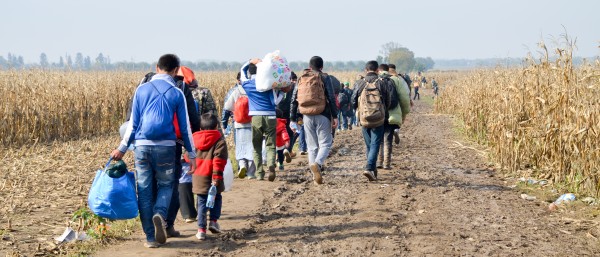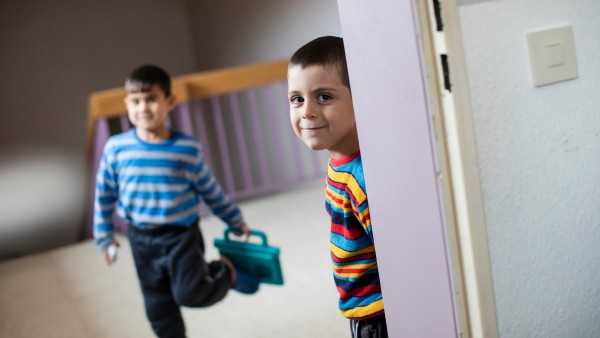More and more people around the world are leaving their homes. The number of refugees is at its highest level since the Second World War. Ukraine accounts for a large part of this. KfW Stories talks to the UNHCR representative in Berlin, Katharina Lumpp, about how refugees are doing and why we should continue to think about other parts of the world.
About Katharina Lumpp

Katharina Lumpp has been a representative of the UN Refugee Agency (UNHCR) in Germany since the beginning of 2021. She already held this position between 2015 and 2017. However, the law graduate spent most of her professional life abroad. In her almost thirty years of work for the UNHCR, she has worked in Egypt, Afghanistan, Jordan, the Democratic Republic of Congo, Turkey and the Balkans, among other places. As a result, she has provided support during some of the largest refugee crises of recent decades.
Find out moreSince 24 February, almost five million Ukrainians have fled to neighbouring countries, and another seven million have been displaced within the country. Has this ever happened to such an extent and at such speed?
The dimensions are unprecedented. There have been situations where many people have fled in a short time, such as Rohingya people from Myanmar. But the refugee movement we are now seeing in Ukraine is unique. It is currently the second largest refugee situation in the world. No situation has developed this rapidly since the Second World War. The only place where more people were forced to flee was in Syria, but in this case, we are in the 12th year of the conflict, and we see 6.8 million refugees and nearly 7 million internally displaced persons.
How are refugees from Ukraine doing? Can general statements be made about their situation?
Finding accommodation for them worked relatively well. There are several reasons for this: Host countries – such as Poland – have access to comparatively high levels of resources; more funds are also available overall than in other crises. Solidarity and willingness to help in the region are enormously high, meaning that many refugees were able to find accommodation through private means. As a result, most refugees have found a new place to live. However, the need for psychosocial support is very high because the people who fled from Ukraine are primarily women and children. They have a higher risk of being exposed to gender-specific violence and exploitation. In addition, many are suffering greatly as they have been separated from their families.
Does this mean that this refugee crisis is huge, but can still be managed with relative ease?
I wouldn’t go that far. The situation is very volatile and can change quickly depending on how the war unfolds. The difficulties could then grow quickly, and we need to adapt to whatever happens. Now we also need to begin thinking about next winter and provide winter-proof accommodation. Although the situation seems to be reasonably stable at the moment, the challenge remains great.
Reportedly, the first refugees are already returning. Can you confirm this?
There are cases where this is true but, according to our knowledge, these people are often not returning permanently. Many tell us that they want to look for family members, check the condition of their home and then leave again. The situation in Ukraine is still too unstable for a permanent return.
We were just discussing Ukraine. What is the overall situation of refugees in the world?
We are seeing a general upward trend, with currently more than 100 million refugees or internally displaced persons in total. Two thirds of them come from only five countries: Syria, Ukraine, Afghanistan, Myanmar and South Sudan. They have fled due to conflicts and serious human rights violations. If the conflicts were resolved or mitigated in at least some of these countries, we could solve a good part of the global refugee problem.
This means that conflicts are the most important reason why people leave their homelands? It isn’t hunger or drought or something similar?
Yes, definitely. Conflicts are the main reason people flee.
Doesn’t climate change play a role?
From our perspective, the consequences of climate change have an impact as a multiplier and increase risks. Climate change can, above all, become a factor in why people flee – including across international borders – if it further exacerbates existing conflicts and political, ethnic and social tensions that lead to violence and human rights violations. For people who are forced to leave their home towns due to climate-related changes, for example due to extreme weather events, we observe that they often stay in their own country. They flee over shorter distances and usually temporarily. In the event of a drought, for example, people leave the dry region, but remain in the area and return when it rains and they can sow seed again.
Does the refugee crisis in Ukraine affect other parts of the world? For example, as s a lot of money goes there that would be needed elsewhere?
The danger exists and is very real. We should never overlook what else is happening in the world. Especially since the war in Ukraine has had a global impact on the situation of refugees and internally displaced persons worldwide. The shortage of food and the rising food and energy prices that we are currently experiencing due to the Ukraine war are hitting refugees and other vulnerable population groups particularly hard, and this should definitely be cushioned.
Is it true that most refugees want to return to their home country as soon as possible?
That is true, and it applies above all to the first years of a crisis. At some point, the children go to school at the new location, learn a new language, and integrate. In our experience, all refugees very much long to return home, but time changes actuality. That is why it is all the more important that conflicts do not solidify. The sooner they are solved, the greater the likelihood that people will be able to return to where they came from.
Is there such a thing as a “typical” refugee?
Not really, because every situation is different. In Ukraine, it is mostly women and children, while in Syria, many young men have also fled because they did not want to be forced into military action against their own people. There is no archetype of a refugee. Nevertheless, refugee flows often represent the composition of a society at a micro level – e.g. in terms of age and social origin.
What role does Germany play in international refugee aid?
The Federal Republic is one of the most important partners in the world – as the second largest humanitarian donor after the USA and one of the largest host countries of refugees. Germany plays a unique double role and thus enjoys great international credibility. It was also a co-organiser of the first Global Refugee Forum in 2018 and actively participates in the implementation of the Global Compact on Refugees.
What exactly was decided at this forum and why was it important?
The first Global Refugee Forum took important steps and made commitments to improve international responsibility for refugee protection and to implement the Global Compact. With the Compact, the international community has set itself the goal of responding better to major refugee situations. This includes, among other things, providing greater support to host countries, but also means that humanitarian aid, development cooperation, the private sector, UN organisations and NGOs have improved cooperation.
What role can and should development cooperation play in the event of refugee crises? These are usually very acute and thus represent the opposite of the long-term perspectives that development measures usually aim to achieve.
From our point of view, it is very important that development actors are involved from the outset in the event of refugee crises. In addition to direct aid, it is precisely then that additional investments are needed in the host countries, which would otherwise quickly become overwhelmed. For example, support for their health and education systems to strengthen them and to integrate refugees more easily and quickly. This will help both refugees and the local population. In the case of Ukraine, for example, Moldova, which has a particularly high percentage of refugees to provide for, now needs international support. This also applies to Lebanon as a result of the Syrian conflict and other host countries, many of which have limited economic resources.
You yourself have worked abroad for the UNHCR for many years and have experienced the fate of refugees up close. What have you seen that left you particularly shaken?
I have seen things everywhere that have moved me, but also things that impressed me. I have watched returnees rebuild their homes in the midst of rubble with a tenacious will. And I have seen moments when the refugees themselves don’t actually own anything and yet share the last piece of bread with others. These encounters stay with you. And of course, I have witnessed the indescribable misery that displacement brings. That is why the international community should make every effort to defuse conflicts as quickly as possible. This is the best recipe for tackling the global refugee crisis.
Published on KfW Stories on 20 June 2022.



Data protection principles
If you click on one of the following icons, your data will be sent to the corresponding social network.
Privacy information